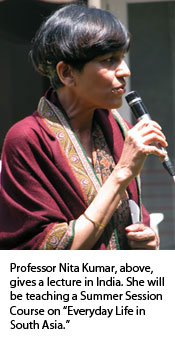 How people live in South Asia and how they've lived for almost two millennia is the subject of an upcoming summer session course to be taught by Nita Kumar, Brown Family Professor of South Asian History at CMC.
How people live in South Asia and how they've lived for almost two millennia is the subject of an upcoming summer session course to be taught by Nita Kumar, Brown Family Professor of South Asian History at CMC.
The intensive three-week course, "Everyday Life in South Asia," focuses on the mix of peoples (Indian, Pakistani, Bangladeshi, Sri Lankan and Nepali) that make up the region
"We will try to understand the practices of work and professional culture; of caste and hierarchy; of gender and family; of love and pleasure; and of religion and sectarianism," Kumar says. "And we will look at fascinating data across centuries, 300 CE to the present, on these issues."
Kumar stresses that the class will not be interested in just simple facts; it will question the nature of work and leisure, of religion and caste from the perspective of actual people. ***
CMC: What, in your opinion, is the most important reality that students or people in general should know about South Asia?
Kumar: South Asia, like the rest of the world, is both exotic and ordinary. People really need to know this concretely! It is full of intriguing philosophical and value systems, a romantic mainstream history and many other exciting regional histories; it has drama, including conflict, intrigue, empire, invention, discovery, etc., that makes other histories pale. It has puzzling formations like caste and dowry; and it has amazing personalities. But there is realism to its practices that would be familiar to everyone in a modern society: it includes indigenous capitalism, individualism and the pursuit of happiness, and a hugely reflexive irony and humor. CMC: What's your favorite regional Asian cuisine or dish from the countries covered in your course?
Kumar: I am crazy about 'chaat' a savory concoction of a sweet and sour snack with many different ingredients. It is served sometimes as an appetizer in Indian restaurants. I also love South Indian cuisine: dosa, bara, idli and sambhar. CMC: Do you have a favorite South Asian country or place that you visit?
Kumar: I like Bangladesh and Sri Lanka, but have visited them only for conferences. Probably, because of my Islamic interests and background, I am closest to Pakistan. My research is on historical India before it was divided, and what I'd say is that all of India' or South Asia' is one civilization and I love every place in it. CMC: What is the major perception (true or otherwise) that you find many South Asian people have about the U.S. or life in the U.S.?
Kumar: Ordinary South Asians have two stereotypes about Americans: that they are materialist and will put money above everything else, such as family, friends, and values; and that there are loose sexual mores in this country. Unfortunately, the TV shows and other channels of information from the U.S. to South Asia perpetuate these stereotypes. No one there can easily know about other values, about natural beauty, or about human struggles and civic life in the U.S. CMC: What is the most fun for you about teaching this course?
Kumar: Finding ways to translate complex realities into simpler observations that make sense to students encountering South Asia for the first time, while, at the same time, challenging them to think outside the box. CMC: Historically, what for you is the most fascinating epoch or event that occurred in South Asia?
Kumar: There are many! Recently, I am interested in two different epochs: one is the reign of Akbar, a fascinating monarch. The second is the introduction of English as a language of higher education and the experience of Indians with it. (I just tried to write a children's book off the cuff, "A Monster called English.") But I also find the Vedic civilization very fascinating. CMC: Looking ahead, what is the greatest challenge facing South Asia in the next few years?
Kumar: How to find a historical path that is more egalitarian than that of present-day democracies. Indeed, in my own research, I try to envision historical documentation that would do more justice to ordinary people and their preoccupations in everyday life than regular history does. *** This is the seventh in a series of stories about CMC faculty teaching during the 2011 Summer Session. For additional information on this course, please visit Professor Kumar's profile page for contact information and office hours.
CMC's 2011 Summer Session begins May 23rd and will offer both three- and six-week courses, all taught by CMC faculty.
Everyday Life in South Asia isTopic of Summer Session Course
